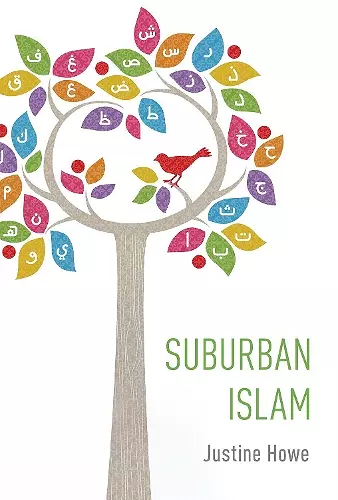Suburban Islam
Format:Paperback
Publisher:Oxford University Press Inc
Published:6th Oct '21
Currently unavailable, and unfortunately no date known when it will be back

For many American Muslims, the 9/11 attacks and subsequent War on Terror marked a rise in intense scrutiny of their religious lives and political loyalties. In Suburban Islam, Justine Howe explores the rise of "third spaces," social surroundings that are neither home nor work, created by educated, middle-class American Muslims in the wake of increased marginalization. Third spaces provide them the context to challenge their exclusion from the American mainstream and to enact visions for American Islam different from those they encounter in their local mosques. One such third space is the Mohammed Alexander Russell Webb Foundation, a family-oriented Muslim institution in Chicago's suburbs. Howe uses Webb as a window into how Muslim American identity is formed through the interplay of communal interpretive practices, institutional rituals, and everyday life. The diverse Muslim families of the Webb Foundation have transformed hallmark secular suburbanite activities like football games, apple picking, and camping trips into acts of piety--rituals they describe as the enactment of "proper" American Muslim identity. Howe analyzes the relationship between these consumerist practices and the Webb Foundation's adult educational programs, through which participants critique what they call "cultural Islam." They envision creating an "indigenous" American Islam characterized by gender equality, reason, and pluralism. Through changing configurations of ethnicity, gender, and socioeconomic class, Webb participants imagine a "seamless identity" that marries their Muslim faith to an idealized vision of suburban middle-class America. Suburban Islam captures the fragile optimism of educated, cosmopolitan American Muslims during the Obama presidency, as they imagined a post-racial, pluralistic, and culturally resonant American Islam. Even as this vision aims to be more inclusive, it also reflects enduring inequalities of race, class, and gender.
[a] masterfully written ethnographic study ... Howe paints an artful portrait of one community coping in ordinary ways with an extraordinary assault on their cultural citizenship. Howe's book will appeal to both scholars and advanced students in the humanistic and social scientific study of Islam and other American religions. She writes as an embodied ethnographer ... Howe offers a compelling discussion of how contemporary non-Muslim and Muslim academics' production of knowledge * including her ownbecomes a resource for intra-Muslim identity work ... Howe's book provokes us to resist reifying the shifting ground of religious lives in multiple and unexpected spaces.Lance D. Laird, Journal of Religion *
From spatial analysis and lived religion, to consumer culture and immigration studies, Suburban Islam makes more interventions than its brief title suggests. It is a delight to read, and students and scholars of Islam in America, religion and space, and religion and consumer culture will find Howe's work particularly useful. * Michael McLaughlin, Reading Religion *
Howe's work is important in the scholarship of Muslim Americans, giving us a view into what Islam looks like for young professionals in suburban America. Her discussion of the community's attempt at separating culture and religion is a theme that exists beyond the Muslim American community ... Howe provides a key component in better understanding Muslims in America by contributing a thorough case study of suburban Islam. * Iman Ahmad-Sediqe, Review of Religious Research *
A tour de force! This beautifully written ethnography analyzes a suburban Islam fashioned in the context of American gender relations, consumer culture, racialization, socioeconomic privilege, and above all, Islamophobia. Howe richly depicts the religious culture of this 'third space,' where Muslims study and debate the Qur'an and Islamic ethics, form meaningful personal relationships, and celebrate the Prophet Muhammad's birthday. The book reveals a unique portrait of the multiple and contested meanings of being Muslim and being American in our era. * Edward E. Curtis IV, author of Muslims in America: A Short History *
This book provides a theoretically nuanced and multilayered exposition of the construction of Islamic spaces and religious authority among middle-class American Muslims whose beliefs and practices * until nowhad eluded critical examination because very few of them affiliate with mosques or national Muslim organizations. Howe has given us a model for understanding how everyday practices produce spaces where religious traditions and notions of national belonging are negotiated.-Kambiz GhaneaBassiri, author of A History of Islam in America: From the New World to the New World Order *
Ethnographically rich and analytically powerful, Suburban Islam explores how the upper-middle-class members of Chicago's Webb Foundation navigate and negotiate religious and national belonging in the post-9/11, pre-Trump era. Justine Howe analyzes racialized identieids, including whiteness, and shows how participants demonstrate their Americanness through commitments to the nuclear family, gender equality, and religious pluralism. Suburban Islam is essential reading for both scholars and students. * Kecia Ali, author of The Lives of Muhammad *
ISBN: 9780197558539
Dimensions: 231mm x 150mm x 20mm
Weight: 476g
316 pages